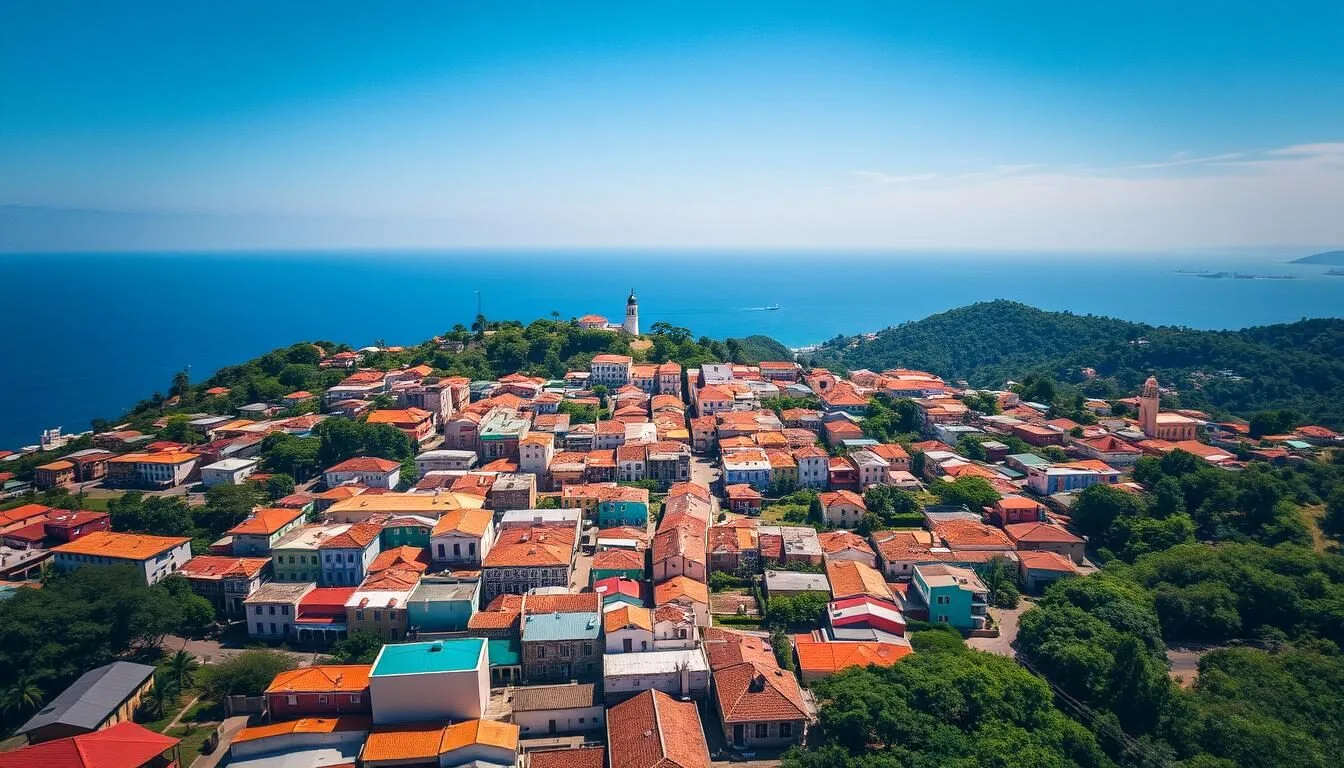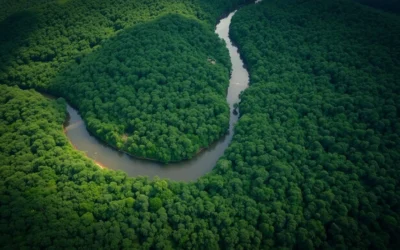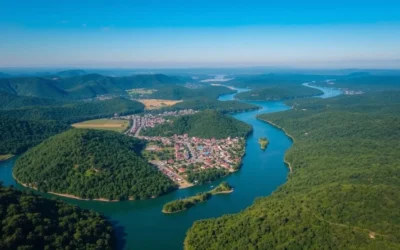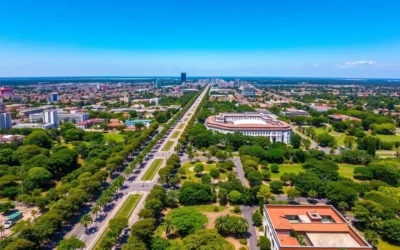Did you know Olinda’s historic center has been recognized as a UNESCO World Heritage Site since 1982, with over 20 Baroque churches packed into just 1.2 square miles? This colorful colonial gem in Northeast Brazil offers travelers a perfect blend of history, art, and vibrant culture that stands in stark contrast to its modern neighbor, Recife. Perched on a hillside overlooking the Atlantic Ocean, Olinda’s cobblestone streets and pastel-colored buildings create one of Brazil’s most picturesque and culturally rich destinations.
Getting There & Planning Your Journey
Most travelers reach Olinda through Recife, which is just 4 miles south and home to Guararapes–Gilberto Freyre International Airport. From Recife, you have several options to reach Olinda:
- By bus: Several public buses connect Recife to Olinda, taking approximately 30 minutes. Look for buses heading to “Olinda Centro Histórico.”
- By taxi or Uber: A convenient option that takes about 20 minutes from Recife’s city center or 30 minutes from the airport.
- By rental car: If you plan to explore the region beyond Olinda, renting a car gives you flexibility, though parking in Olinda’s historic center can be challenging.
For international travelers, you’ll likely connect through São Paulo or Rio de Janeiro before reaching Recife. Plan for at least 2-3 days in Olinda to fully appreciate its charm and cultural offerings.
Ready to start your Olinda adventure?
Find the best flight deals to Recife and begin your journey to Olinda’s colorful streets.
Best Time to Visit & Weather Tips

Olinda enjoys a tropical climate with warm temperatures year-round, typically ranging from the mid-70s to mid-80s Fahrenheit (24-30°C). However, timing your visit strategically can greatly enhance your experience:
Dry Season (September to February)
- Ideal for exploring the historic center on foot
- Perfect beach weather
- Higher tourist numbers, especially in December and January
- Peak hotel prices during holiday seasons
Rainy Season (March to August)
- Brief but sometimes heavy afternoon showers
- Fewer tourists and lower prices
- Lush, green landscapes
- More comfortable temperatures for walking
Carnival Season (February/March)
Olinda hosts one of Brazil’s most authentic and vibrant Carnival celebrations, featuring giant puppets (bonecos gigantes), lively street parties, and traditional music. If you visit during this time, book accommodations months in advance and prepare for higher prices, but the cultural experience is unmatched.
Traveler Tip: Pack light, breathable clothing, sunscreen, and a small umbrella regardless of when you visit. The tropical sun can be intense, and brief showers can occur even during the dry season.
Getting Around Locally

Olinda’s historic center is compact and best explored on foot, though be prepared for steep hills and uneven cobblestone streets. Here’s how to navigate this charming colonial town:
Walking
The most authentic way to experience Olinda is by wandering its narrow streets. The historic center is relatively small, and most attractions are within walking distance of each other. Wear comfortable shoes with good traction, as the cobblestones can be slippery, especially after rain.
Taxis and Ride-Sharing
Taxis are readily available and can be a good option for traveling between Olinda and Recife or reaching attractions outside the historic center. Uber also operates in the area and often offers more competitive rates than traditional taxis.
Public Transportation
Local buses connect Olinda to Recife and surrounding areas. They’re affordable but can be crowded during peak hours. Ask your hotel for the most convenient bus routes for your specific destinations.
Explore Olinda with ease
Rent a car to discover Olinda and the surrounding region at your own pace.
Accessibility Note: Olinda’s steep hills and cobblestone streets can be challenging for travelers with mobility issues. Consider staying in the lower part of town or using taxis to reach the higher viewpoints if mobility is a concern.
Where to Stay (lodging options)
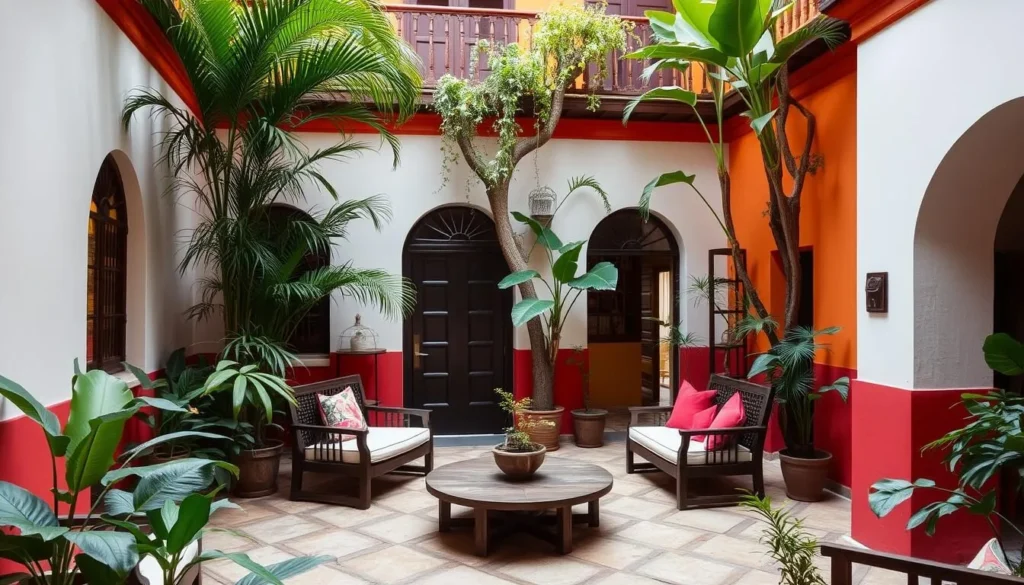
Olinda offers a range of accommodation options, from historic pousadas (traditional Brazilian guesthouses) to modern hotels. Where you choose to stay will greatly impact your experience of this colonial gem:
Historic Center Pousadas
For an authentic experience, stay in one of Olinda’s charming pousadas housed in restored colonial buildings. These boutique accommodations often feature traditional décor, personal service, and sometimes stunning views of the city or ocean.
Top Pousada Picks:
- Pousada dos Quatro Cantos – Located at one of Olinda’s main intersections, this 19th-century building offers central access to the city’s nightlife and cultural events.
- Pousada Convento da Conceição – A converted 16th-century convent offering unique accommodations with historic charm and beautiful grounds.
- Pousada São Pedro – Located near Praia dos Milagres beach, offering simple but comfortable rooms and a swimming pool.
Beachfront Options
If you prefer ocean views and easy beach access, consider staying in one of the hotels along Olinda’s coastline. These typically offer more modern amenities and are a short taxi ride from the historic center.
Recife Accommodations
Some travelers choose to base themselves in nearby Recife, which offers a wider range of international hotel chains and luxury options. From there, Olinda can be visited as a day trip, though you’ll miss experiencing the town’s magical atmosphere after dark.
Booking Tip: Reserve accommodations well in advance if visiting during Carnival or Brazilian holiday periods. Prices can double or triple, and availability becomes extremely limited.
Dining & Local Cuisine

Olinda’s culinary scene reflects its rich cultural heritage, with strong influences from Portuguese, African, and indigenous traditions. The city offers everything from simple street food to sophisticated restaurants serving northeastern Brazilian specialties.
Must-Try Local Dishes
- Acarajé – Deep-fried patties made from ground black beans, split and filled with a spicy paste of ground peanut, dried shrimp, coconut milk, and chili, topped with fried onions.
- Tapioca – Pancakes made from manioc (cassava) flour, folded with savory or sweet fillings like cheese, coconut, or Romeu e Julieta (cheese and guava paste).
- Moqueca – A flavorful seafood stew made with fish, shrimp, or crab, cooked in coconut milk with tomatoes, onions, and coriander.
- Bolo de Rolo – A thin layer of sponge cake rolled with guava paste, a traditional Pernambuco dessert.
Where to Eat in Olinda
Historic Center Restaurants
- Oficina do Sabor – Serving Pernambucan classics with a view
- Restaurante Beijupirá – Upscale northeastern cuisine in a treehouse setting
- Bar do Amparo – Lively spot near Quatro Cantos with great people-watching
Traditional Bars
- Bodega de Veio – Classic bar with a wide selection of beers and cachaças
- Bar do Peneira – Authentic boteco known for its owner who sometimes naps at the entrance
- Cavallotti Cervejaria – One of the few places offering craft beer on tap
Street Food at Alto da Sé
For an authentic local experience, head to Alto da Sé in the late afternoon when food stalls set up shop. Try the tapioca pancakes and acarajé from Tapioca da Jura for a true taste of northeastern Brazil.
Foodie Tip: Look for restaurants serving “comida caseira” (home-style cooking) for the most authentic local flavors at reasonable prices.
Attractions, Sightseeing & Activities
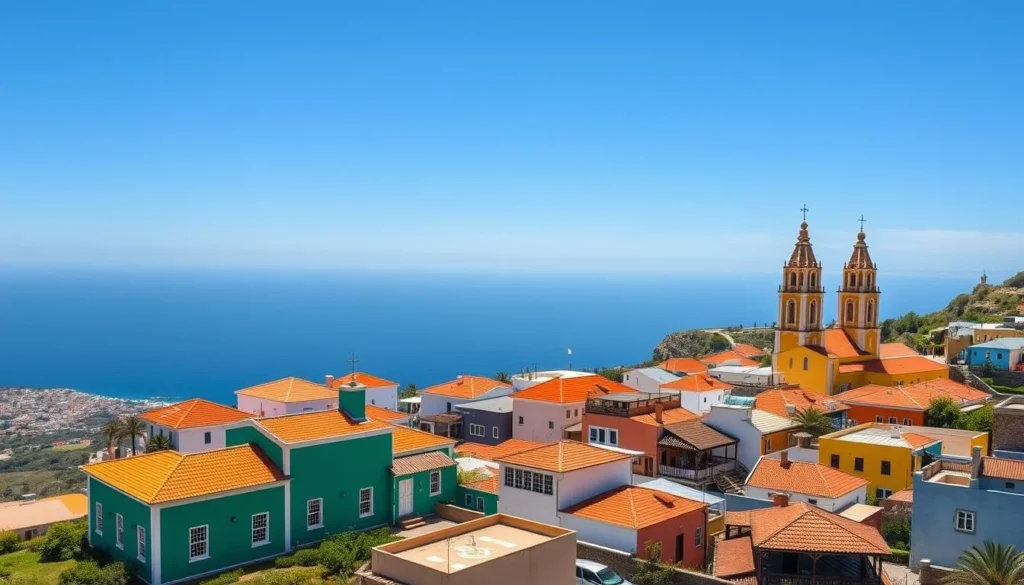
Olinda’s charm lies in its well-preserved colonial architecture, vibrant arts scene, and stunning ocean views. Here are the must-see attractions and activities for your visit:
Historic Center Highlights
- Alto da Sé – One of the highest points in Olinda offering sweeping views of the city, Recife’s skyline, and the Atlantic Ocean. The square is surrounded by craft markets and food stalls.
- Rua do Amparo – Olinda’s cultural hub, lined with artist studios, restaurants, and boutique pousadas. Many buildings feature impressive street art and colorful facades.
- Quatro Cantos – The intersection of Rua Amparo and Rua Prudente de Moraes, this is the main gathering spot for street music and nightlife.

Religious Sites
With over 20 churches, Olinda offers plenty of architectural and historical treasures to explore:
- Catedral Alto da Sé – The oldest parish church in northeast Brazil, built in 1535 and reconstructed in the 18th century.
- Igreja e Mosteiro São Bento – Known for its stunning golden altar and Portuguese azulejo tiles. Visit on Sunday mornings to hear Gregorian chanting.
- Convento de São Francisco – The first Franciscan convent built in Brazil, featuring beautiful cloisters decorated with Portuguese tiles.
- Igreja do Carmo – A beautiful Baroque church that dominates the skyline of upper Olinda.
Experience Olinda’s rich history and culture
Book a guided tour to discover the hidden stories behind Olinda’s colonial treasures.
Museums, Cultural Spots & Festivals

Museums
- Museo de Mamulengo – Housing a collection of over 1,000 puppets, some dating back to the 19th century. Mamulengo is the traditional puppetry art form of the region.
- Casa dos Bonecos Gigantes – See the famous giant puppets (bonecos gigantes) used in Olinda’s Carnival parades, representing Brazilian cultural icons and world personalities.
- Pernambuco Museum of Sacred Art – Browse religious artworks and artifacts dating back to the 16th century, housed in a former government building.
- Museu de Arte Contemporânea – Set in a former Inquisition building, this museum displays work by local contemporary artists.
Markets and Craft Centers
- Mercado da Ribeira – Once a slave market, this historic building now houses artisan shops selling local crafts and souvenirs.
- Alto da Sé Craft Market – Browse handmade crafts, artwork, and souvenirs while enjoying panoramic views of the city.
- Centro de Artesanato de Pernambuco – A newer addition to Olinda’s craft scene, offering high-quality local artisan products.

Festivals
Olinda’s cultural calendar is packed with festivals and celebrations throughout the year:
- Carnival (February/March) – Olinda’s most famous celebration features street parties, traditional music, and the iconic giant puppets parading through the streets. Unlike Salvador and Rio, Olinda’s Carnival is free and more accessible.
- Festa de Nossa Senhora do Carmo (July) – Religious celebration honoring Our Lady of Carmel, the patron saint of Olinda.
- MIMO Festival (November) – International music festival featuring performances in historic churches and public spaces.
Cultural Tip: Even outside of Carnival season, you can often find spontaneous music performances and cultural events in Olinda’s historic center, especially around Quatro Cantos on weekend evenings.
Sports, Nature & Outdoor Experiences
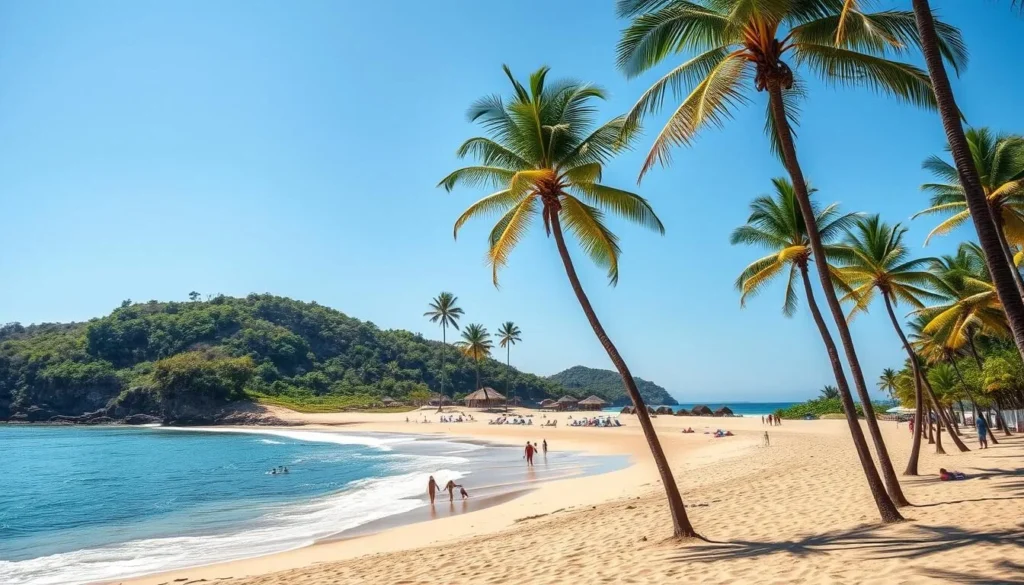
While Olinda is primarily known for its cultural and historical attractions, the city also offers several outdoor experiences for nature lovers and active travelers:
Beaches
Olinda boasts several beaches along its coastline, each with its own character:
- Praia dos Milagres – A quieter beach with golden sand and calm waters, perfect for relaxing.
- Praia de Olinda – The main city beach, popular with locals and offering basic amenities.
- Praia do Farol – Named after the nearby lighthouse, this beach offers good swimming conditions.
- Praia da Casa Caiada – A longer stretch of beach with a more local atmosphere.
Beach Safety: While Olinda’s beaches are generally safer than those in Recife (which has shark concerns), always pay attention to warning flags and lifeguard instructions.
Walking Tours
The hilly terrain of Olinda makes for excellent walking tours that combine exercise with sightseeing. Several companies offer guided walking tours of the historic center, or you can create your own route connecting the main attractions.
Nearby Natural Attractions
If you have extra time and transportation, consider these natural attractions near Olinda:
- Itamaracá Island – About an hour north of Olinda, offering pristine beaches and the historic Fort Orange.
- Coroa do Avião – A small sandbar island accessible by boat from Itamaracá, perfect for bird watching and swimming.
- Porto de Galinhas – One of Brazil’s most beautiful beach destinations, located about 1.5 hours south of Olinda.
Explore beyond Olinda
Book a day trip to discover the natural wonders surrounding Olinda.
Safety, Etiquette & Local Customs

Safety Tips
Olinda is generally safer than many larger Brazilian cities, but standard travel precautions still apply:
- Avoid walking in dimly lit or deserted streets after dark, particularly at the bottom of Olinda or near the lighthouse area.
- Use Uber or taxis for night transportation rather than walking long distances.
- Keep valuables out of sight and be discreet with cameras, phones, and jewelry.
- Stay in populated areas, especially at night, where there are other tourists and locals.
- The historic center typically has police presence, especially during weekends and festivals.
Local Etiquette
Brazilians are generally warm and welcoming, but observing these customs will enhance your experience:
- Greetings often include a kiss on each cheek between women or between men and women (men typically shake hands).
- Learning a few basic Portuguese phrases is greatly appreciated by locals.
- Tipping is not as common as in some countries, but 10% is standard in restaurants (often included in the bill as “serviço”).
- Dress is casual but neat; Brazilians tend to take pride in their appearance even in hot weather.
Cultural Sensitivity
Olinda has a rich Afro-Brazilian heritage, and many cultural elements have deep historical and religious significance:
- Show respect when visiting churches and religious sites by dressing modestly and speaking quietly.
- Ask permission before photographing individuals, especially during religious ceremonies.
- Be aware that Olinda’s history includes the slave trade; some sites like Mercado da Ribeira have a painful historical context.
Language Tip: While English is spoken in some tourist establishments, having Google Translate or a similar app handy can be very helpful for communication.
Practical Travel Tips
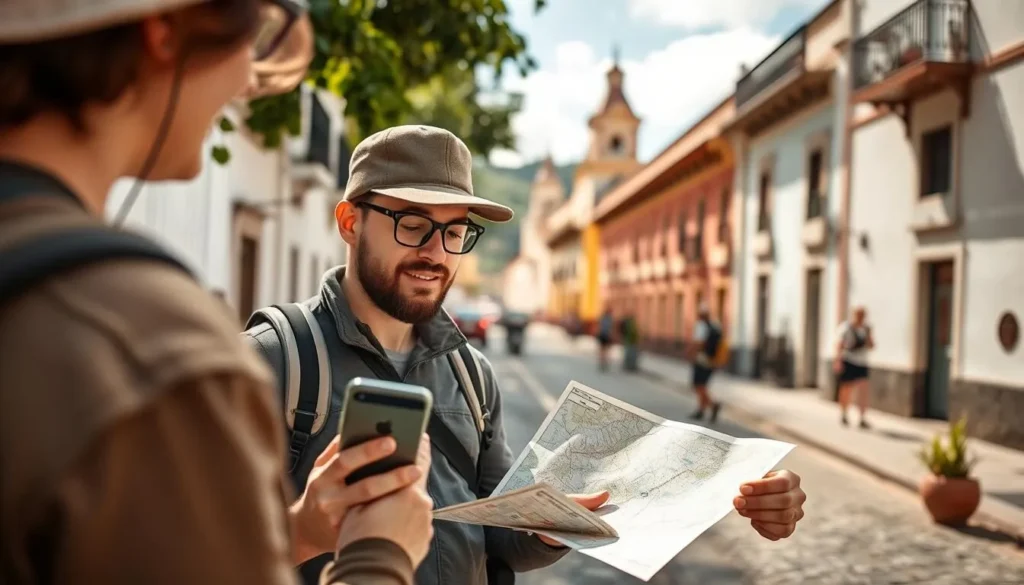
Money Matters
- The Brazilian currency is the Real (R$). ATMs are available in Olinda, but it’s wise to carry some cash, especially for smaller establishments.
- Credit cards are widely accepted in hotels and larger restaurants but may not be taken by street vendors or smaller shops.
- Notify your bank of your travel plans to avoid card blocks for international transactions.
Connectivity
- Purchase a local SIM card for affordable data access; major providers include Claro, TIM, and Vivo.
- Many restaurants and hotels offer free Wi-Fi, though connection quality can vary.
- Download offline maps of Olinda before your trip for navigation without data.
Health & Comfort
- Drink bottled water rather than tap water.
- Apply sunscreen regularly; the tropical sun is intense even on cloudy days.
- Carry a small towel or handkerchief to manage perspiration in the humid climate.
- Basic medical services are available in Olinda, with more comprehensive care in nearby Recife.
Useful Portuguese Phrases
- Olá – Hello
- Bom dia/tarde/noite – Good morning/afternoon/evening
- Por favor – Please
- Obrigado/Obrigada – Thank you (male/female speaker)
- Quanto custa? – How much does it cost?
- Onde fica…? – Where is…?
- Não entendo – I don’t understand
- Fala inglês? – Do you speak English?
Planning Tip: Consider combining your visit to Olinda with time in Recife and perhaps a trip to the island paradise of Fernando de Noronha, which is accessible via flights from Recife.
Ready to Experience Olinda?

Olinda offers travelers a perfect blend of history, culture, and authentic Brazilian experiences. From wandering its cobblestone streets and admiring colonial architecture to enjoying local cuisine and vibrant festivals, this UNESCO World Heritage Site deserves a place on any Brazil itinerary.
Whether you visit during the excitement of Carnival or enjoy the more relaxed pace of the off-season, Olinda’s colorful charm and warm hospitality will leave you with lasting memories of one of Brazil’s most picturesque destinations.
Plan your Olinda adventure today
Use these resources to book your perfect trip to Olinda, Brazil.
The above is subject to change.
Check back often to TRAVEL.COM for the latest travel tips and deals.
